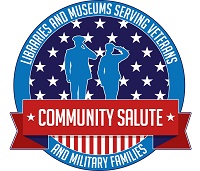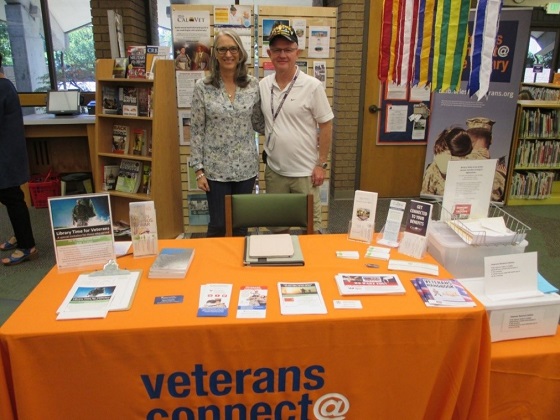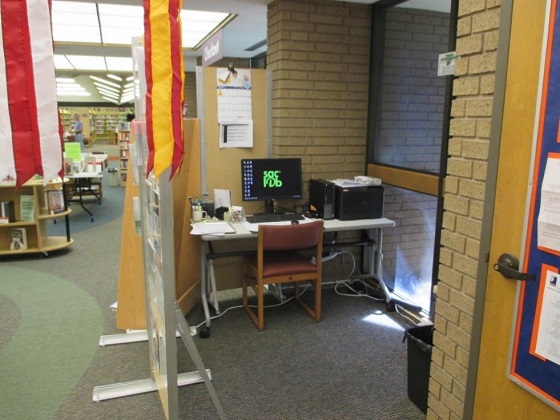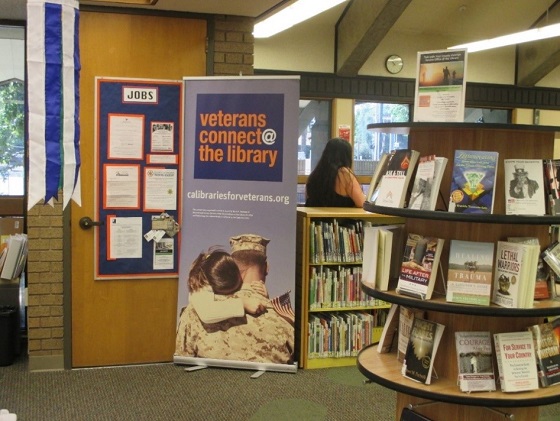Blog Posts | November 14, 2016
Share This
Editor’s Note: In September, IMLS announced a cooperative agreement with FSG to strengthen the ability of libraries and museums to fulfill the unique and critical needs of veterans and military families. Through the Community Salute program, IMLS will gather information from a variety of key stakeholders in the library, museum, and military communities; identify opportunities for enhancing community services; and develop frameworks, tools, and resources to strengthen the role libraries and museums have in addressing the specific needs of veterans and military families. This is the latest a series of Community Salute blogs highlighting the role that many libraries and museums already play in the lives of veterans and military families.
By Teresa DeVoe
IMLS Senior Program Officer
Public libraries have long been in the business of helping their communities find information. For California libraries, where the number of veterans is the highest in the nation, that business lately includes connecting with former service members and veteran family members and becoming a pathway to their enrollment in eligible services.
A pilot project that began several years ago in three locations is now available in 38 library branches across California and will soon number 51, with statewide coordination and outreach. Known as Veterans Connect @ the Library, it builds from what libraries already offer their communities – friendly, welcoming spaces that provide information and sometimes-unanticipated connections.

At Rancho Cordova Library in Sacramento, 17 volunteers staff the brightly colored Veteran Resource Center, including Bill Mattingly, a Vietnam veteran who served with the Marines. Library patrons may pass Bill’s table several times before engaging with him, and he often hears variants of ‘I served, but I’m not a veteran.’ Those words can kick-start a conversation that leads to veterans exploring their status and benefits for the first time in years. As those discussions begin to touch on confidential issues, Bill and other volunteers can offer veterans a more private space within the Center to continue their conversations, as well as a dedicated computer to pursue next steps.
The participating libraries do not determine eligibility, but work in partnership with the California Department of Veterans Affairs – CalVet – as well as County Veterans Service Officers, who authorize benefits in a variety of areas. The project’s effort to increase the number of registered veterans in the CalVet reintegration system ultimately connects this work to the VA and eases enrollment in benefits and health care services.
Many Veteran Resource Centers have cultivated other local partnerships, like Rancho Cordova Library’s outreach to nearby Mather VA Hospital. When the library is otherwise closed, a shuttle brings veterans from the facility every fourth Friday of the month for dedicated time in the library. Other targeted programming has included writing workshops, author events, and Social Security disability benefits sessions.

Coordinators at the state level have worked to make the process as seamless as possible for participating libraries. Federal funds from the Institute of Museum and Library Services administered by the California State Library support the purchase of start-up materials for each Veteran Resource Center. These include the branded orange tablecloth, flags, posters, a computer, and a small collection of materials. Though libraries have the flexibility to configure their spaces as needed, they follow the basic program model, which is: 1) finding a staff person to drive the program; 2) identifying the local authorized claims agency; 3) setting up a small collection of materials; and 4) developing a webpage for local resources.
The state-level coordinators are now working on a public service announcement campaign to run in traditional and social media. Jacquie Brinkley, one of two project managers with Pacific Library Partnership, notes, “Our veterans across the country would be well-served if libraries in every community could provide some level of services like these.” So far the project has reached 16,000 veterans and/or their family members, and with a PSA behind it, these numbers will certainly continue to grow.

As for Rancho Cordova Library’s Veteran Resource Center, it has thrived in part due to the passion of their librarian coordinator, Evelyn Figeroid, whose father was a WWII Veteran. She has forged partnerships with legal resources in the Sacramento area, as well as the local Veterans of Foreign Wars (VFW) organization, and she hears again and again how much this service is needed. Evelyn credits her volunteers and many partners for their role in this important work, saying, “Our veteran community is very lucky to have so many cause-driven advocates ready to help.”
It’s a cause that the average public library is also well-positioned to support, and through targeted programming like Veterans Connect @ the Library, it’s clear that libraries can, indeed, change lives.
About the Author
Teresa DeVoe is a senior program officer in the Office of Library Services at IMLS. She can be reached at TDevoe@imls.gov.
